Measure for Measure
By William Shakespeare
Written about 1604 and first printed in the 1623 First Folio
Act I, Scene 1
The Duke of Vienna (named Vincentio in the Folio's list of roles, but not named in the play) tells his chief advisor, Escalus, that he is going on a sabbatical from governance but won't say where. Though Escalus is the senior advisor, the Duke names Angelo, known for being a studious, upright young man, as his deputy to rule in his absence. Angelo hesitantly accepts his charge, and the Duke departs with no ceremony, leaving Angelo and Escalus puzzled by both the duke's actions and their assigned roles.
Act I, Scene 2
A gentleman of Vienna, Lucio, and two of his friends engage in some early 17th century locker room talk with Mistress Overdone, a whorehouse madam. She tells the gentlemen of Claudio being arrested and sentenced to execution for getting a woman named Juliet pregnant. As the gentlemen hurry off to learn more, Pompey, Overdone's tapster (and pimp of her house), tells his mistress that in addition to arresting Claudio, the Vienna government has issued a proclamation to tear down the houses of prostitution in the suburbs (in those days, the 'burbs were the sleazy parts of town, where stood Shakespeare's theater at the time he wrote this play).
Act I, Scene 3
The Provost is leading Claudio and Juliet to prison when Lucio and his buddies come upon them. Lucio learns that though Juliet is betrothed to Claudio and their desires outsped the contractual process, under Angelo's strict reading of the law, Claudio has committed lechery and must die for it. Claudio has a sister, Isabella, who this very day is entering a cloister. Claudio asks Lucio to get Isabella to appeal to Angelo.
Act I, Scene 4
The Duke hasn't left Vienna. He's with his religious counselor, Friar Thomas, explaining his reasons for temporarily vacating his governorship. Vienna has strict laws that have grown toothless under the Duke's 14 years of lax rule, he says, and rather than becoming suddenly stern and turning the people against him, the Duke is counting on Angelo to enforce the laws without blowback on himself. Meanwhile, the Duke plans to move incognito among the people to watch the impact of Angelo's rule, so he asks Friar Thomas to help him into the disguise of "a true friar." They exit without Friar Thomas responding to this request—a pattern of non-reactions to the Duke's actions that carry to the end of the play.
Act I, Scene 5
Isabella is receiving final instructions from Francisca, a votary of Saint Clare, about the strict ways of the convent when Lucio comes calling. Francisca is not allowed to converse with a man, so Isabella, who has not yet made her vows, greets Lucio. Using much sexual inuendo, Lucio tells Isabella of Claudio's arrest and sentence. The pregnant Juliet is Isabella's cousin (which could mean distant relative or close friend), so she understands how strict a sentence Angelo has imparted on the couple and immediately agrees to make an appeal to the deputy duke.
Act II, Scene 1
Escalus also desires leniency for Claudio, but Angelo will not bend. In fact, Angelo calls in the Provost to set the execution of Claudio for nine the next morning. A constable named Elbow comes into the court leading Pompey and a guy named Froth. Elbow has arrested the two men based on some unexplained incident that happened to Mrs. Elbow in Mistress Overdone's house. Elbow mangles words—the two men he's arrested he calls "benefactors" instead of malefactors, he refers to Angelo and Escalus as "varlots," and he "detests" his wife for being an honest woman. Froth, based on his sparse contributions to this scene, is likely three sheets to an ever-blowing wind. Pompey, though, is grandiloquent in his non-explanation of Froth's encounter with Elbow's wife, whereupon the impatient Angelo leaves Escalus to carry on with the prosecution. The old pro starts asking direct questions, and the best defense Pompey offers for Froth is that his ugly face is the worst thing about him. Though he sees through Pompey's schtick, Escalus has no actual evidence of wrongdoing because Elbow insists that the house and Pompey are "respected." So, Escalus orders that Pompey be allowed to continue his ways while Elbow keeps an eye on him and dismisses Froth, advising him to stay away from Mistress Overdone's house. As Escalus further interrogates Pompey, the tapster pimp stands by his trade, asserting that laws against lechery ultimately undo the state by leaving it unpeopled. Esclaus dismisses Pompey with a warning.
Act II, Scene 2
The Provost double-checks with Angelo about executing Claudio in the morning, and Angelo testily confirms the order. The Provost also seeks appropriate provision for Juliet who is "very near her hour." Isabella enters with Lucio and begins her appeal to Angelo. After a brief exchange she gives up and starts to leave, but Lucio urges her to put in more effort. She turns back to Angelo and engages the deputy duke in a legal argument weighing the precedence of man's law versus heavenly law. Mercy is a tenant of heavenly law, she points out, and great men are made greater when showing mercy. Both Lucio and the Provost root for her in asides, and Angelo is left speechless. He hesitates and asks her to return before noon the next day for his decision. When left alone, Angelo reveals in a soliloquy that Isabella has stirred sexual desires in him, and he now grapples with this soul-splitting condition.
Act II, Scene 3
The Duke, now disguised as a friar, arrives at the prison and meets the Provost, from whom he learns of the sudden sentencing of Claudio. The Provost introduces the Duke to Juliet, and after the Duke hears her confession he lets slip that Claudio is to die tomorrow, which is the first Juliet hears of this.
Act II, Scene 4
The next morning Angelo is far gone, despite his prayers seeking resistance to temptation. "Heaven hath my empty words, whilst my invention, hearing not my tongue, anchors on Isabel." When she arrives for their appointed meeting, he initially tells her Claudio must die, but then he starts riddling about whether she would be willing to give up her virginity to save his life. She condemns such a notion, leading him to point out that her morality makes her as cruel as she claims his morality makes him. Finally, after much dancing around the issue, he proposes that if Isabella will have sex with him, he will spare her brother. She revolts at this suggestion and promises to reveal his proposition publicly. "Who will believe thee, Isabel?" he asks, pointing out that he has an unstained reputation and the power to enforce his will on her. With her threat he turns his proposition into an either-or demand, and he wants her answer tomorrow (presumably, this stays Claudio's execution by at least a day). He leaves a distraught Isabella soliloquizing over her dilemma and aware that nobody would believe her if she spoke out.
Act III
With the Provost standing by, the disguised Duke is counseling Claudio, preparing him for death, when Isabella arrives. As they withdraw, the Duke asks the Provost to place him where he can eavesdrop on Claudio's and Isabella's conversation. Thus, the Duke overhears Isabella tell Claudio of Angelo's demand and Claudio decry the governor for his hypocrisy and assure Isabella she should not give in. But as she expresses her appreciation for Claudio's reaction, he has second thoughts. "Death is a fearful thing," he says, and he begins urging her to rethink her virgin vow. Isabella calls her brother a beast and determines he should die, and quickly, too. The disguised Duke steps forward, sends Claudio off with reiterations that he should prepare for death, and talks with Isabella alone. He reveals that he overheard their conversation and has concocted a plan for her. Angelo was once betrothed to one Mariana but broke off the engagement when her dowry was lost with her brother at sea, but she is still pining for Angelo (even the Duke can barely fathom her devotion). The Duke wants Isabella to agree to Angelo's proposition, but make sure the tryst is to take place in a totally dark, private place. There, Mariana can substitute for Isabella without Angelo knowing. This is called a "bed trick" (using it in two plays, Shakespeare obviously thinks men would easily fall for it). Isabella agrees to the plan and hurries off to set up her date with Angelo.
No sooner has Isabella left the prison then Elbow comes in with the newly arrested Pompey. When Lucio arrives soon after, intending to visit Claudio, Pompey sees him as his bail. But Lucio denies him, and off to confinement Pompey goes. Lucio then engages the disguised Duke in conversation, asking specifically if the friar knows what's become of the absent Duke. This opens the door for Lucio to tell the friar of the Duke's own licentiousness, talking as if he were close companion to the Duke. The disguised Duke contends that Lucio knows not what he speaks and makes sure he gets Lucio's name.
No sooner has Lucio left then Escalus enters with the Provost leading Mistress Overdone, who has been arrested, too. She contends that Lucio is the snitch and she now offers to Escalus information that Lucio got Mistress Kate Keepdown with child and promised her marriage, but 15 months have passed and no ceremony yet. After Mistress Overdone is led away, Escalus bewails the fate of Claudio to the Provost, who points to the disguised Duke as Claudio's confessor. The Duke now plies Escalus for news of his absent self, specifically trying to pin down his own reputation around town (as if he needs reassurance to refute Lucio's assertions).
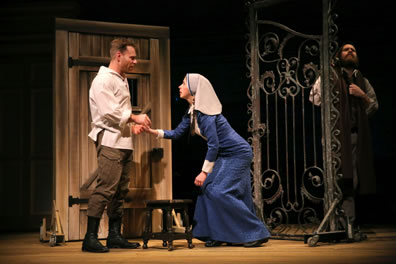
Claudio (Noah Brody, left) talks with his sister, Isabella (Emily Young), about Angelo's proposal for releasing Claudio from prison as Duke Vincentio (Andy Grotelueschen) eavesdrops in Fiasco's 2014 production of Measure for Measure at the New Victory Theater. Photo by Joan Marcus, New Victory Theater.
Act IV, Scene 1
The Duke, still disguised as a friar, visits Mariana who, remarkably, has already spent a lot of time in counsel with this particular priest. Isabella arrives, the Duke introduces the two, and as Isabella in private tells Mariana the plan, the Duke crows to the audience about how the abuser of power will fall. Mariana agrees to participate in the plan as instructed.
Act IV, Scene 2
It's pre-dawn the next morning, and at the prison the Provost offers Pompey a choice: his full sentence plus whipping or parole as assistant to the executioner. Pompey agrees to take the job, but the executioner, Abhorson, is none to happy about involving a pimp in his profession, saying it "will discredit our mystery." Nevertheless, he reluctantly takes Pompey on and leads him off for training. Claudio enters and the Provost shows him the warrant for his execution. As Claudio leaves, the Provost in an aside hopes for a pardon. On cue, the disguised Duke enters promising that a pardon is on its way and, indeed, a messenger soon arrives with a message for the Provost from Angelo: it's a new warrant from Angelo that "whatsoever you may hear to the contrary," Claudio should be executed by 4 am and his head delivered to Angelo for assurance. A prisoner named Barnardine is to be executed in the afternoon. The Duke's plan gone awry, he suggests that the Provost switch the two executions to buy more time for Claudio. The Provost balks at directly disobeying orders—"It is against my oath"—but the Duke reveals a letter with the Duke's signet and says that he knows the Duke is returning in two days, and on this intelligence, the Provost should trust him. Shakespeare writes no reaction for the Provost before they exit.
Act IV, Scene 3
In soliloquy, Pompey describes how he recognizes many of the prison's residents as customers at Mistress Overdone's house. Pompey even names a few, such as Master Rash, young Dizzy, and wild Half-can. Abhorson retrieves Pompey so they can execute Barnardine, but the prisoner contends he is too sleepy and drunk to be executed and refuses to go with them. The Duke arrives to give Barnardine last rites, but he, too, cannot convince the prisoner to die on their schedule. As the Provost enters, the perplexed Duke tells him that Barnardine is "unmeet for death" and killing him in that state would be damnable. So, the Provost tells the Duke that another prisoner, a pirate named Ragozine who looks much like Claudio, just died of "a cruel fever." They can send Angelo his head. The Duke dispatches the Provost to do so and turns his attention to plotting his public return to Vienna. He is interrupted in his meditations first by the Provost carrying Ragozine's head to Angelo and then by the voice of Isabella as she arrives at the prison. The Duke decides to keep her ignorant of Claudio's pending salvation "to make her heavenly comforts of despair when it is least expected." At the news that Claudio was yet executed, Isabella spews two lines of vicious anger before he cuts her off and moves her on to phase two of his plan: accosting the Duke upon his return "tomorrow." He hands her a letter to take to one Friar Peter who will present both Isabella and Mariana to the Duke. Lucio enters, greets Isabella with condolences over her brother and blames the absent Duke for letting all this happen. She departs without comment, leaving Lucio to pick up where he left off in bad-mouthing the Duke to the friar-disguised Duke, a conversation in which he admits "getting a wench with child."
Act IV, Scene 4
Angelo and Escalus ponder the "uneven and distracted manner" of the communications they have each received from the Duke about his return, including the proviso that they proclaim an hour before he enters the city that anybody craving redress of injustice should petition him in the street. Escalus leaves Angelo, who speaks a soliloquy regretting what he has done to Isabella and her brother. But he argues away the first with knowledge that she cannot speak against him, and the latter as reprieving Claudio from a life of sin.
Act IV, Scene 5
The Duke as himself hands a bunch of letters to Friar Peter to deliver to several officials. He also notes that "the Provost knows our purpose and our plot." Varrius enters, the Duke greets him and they walk off together. This is the first we've heard of "my gentle Varrius."
Act IV, Scene 6
Isabella and Mariana discuss the disguised Duke's instructions, though Isabella is almost too frightened to carry them out. Friar Peter fetches them to a place where the Duke shall pass on his processional.
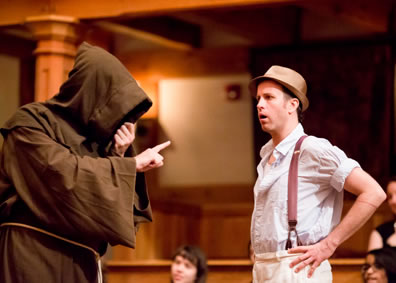
Lucio (Chris Johnston, right) accosts the disguised Duke of Vienna (John Harrell) in the final scene of William Shakespeare's Measure for Measure at the American Shakespeare Center's Blackfriars Playhouse in 2016. Photo by Lindsey Walters, American Shakespeare Center.
Act V
The Duke as himself enters and warmly greets Angelo and Escalus amid a crowd of citizens, of which Lucio is one. Varrius is there, too, according to the stage direction, but he never gets another mention. Friar Peter arrives with Isabella and urges her to make her appeal, which she does. She accuses Angelo, he denies the accusation, but the Duke hears her out. As she tells her story, Lucio interrupts to add verifying details, much to the annoyance of the Duke, who orders him to remain silent (which he's just not able to heed). When she finishes her story—leaving out the bed trick part of it—the Duke, ascribing to Angelo's reputation, wonders if someone has set Isabella on and orders her to prison. The assembly learns that one Friar Lodowick has set her on, which is when we learn for the first time the name of the disguised Duke's friar. Lucio testifies that he knows all about this "saucy friar" and the insulting things he said about the Duke. Friar Peter says Lodowick couldn't be here because of a "strange fever," but presents the veiled Mariana instead. She riddles her way to revealing that she, in fact, lay with Angelo that night. With these new accusations now going beyond even his own awareness, Angelo grows angry at the mounting conspiracy against him. He wants to try the case, and the Duke agrees, placing Mariana and Friar Peter, too, under arrest. The Duke gives his seat to Escalus in judgment and, as he leaves, ordering the Provost to send for Friar Lodowick. Escalus takes over the prosecution, first questioning Lucio about Lodowick. The Duke, now disguised as the friar, soon returns with the Provost and Isabella. The hooded Duke demands to speak only to the Duke and then calls the Duke unjust for leaving the lambs to the fox. Escalus orders Lodowick to be tortured for his treasonous comments, but in the skirmish to arrest the friar, Lucio joins in and pulls off the hood, revealing the Duke. It's an OMG moment for everybody, except the Provost who, at the Duke's order, unbinds Isabella, Mariana, and Friar Peter.
After the Duke keeps Lucio from sneaking away he pardons Escalus for ordering him to be tortured and requests the old counselor remain in his seat while the Duke takes Angelo's chair. Angelo confesses, and the Duke orders Friar Peter to marry Angelo to Mariana immediately. While that is happening, the Duke tells Isabella that he couldn't stop Claudio's death because of the "swift celerity" of Angelo's order that thwarted his plans. Friar Peter returns with the newly married Angelo and Mariana, whereupon the Duke sentences Angelo to instant execution. Mariana appeals, then turns to Isabella to help in her appeal. "Against all sense you do importune her," the Duke says, but Isabella does, in fact, join with Mariana in appealing for mercy on Angelo. The Duke maneuvers a way to get the Provost to fetch Barnardine and a second hooded prisoner, along with Juliet. After the Provost unveils the other prisoner as Claudio, the Duke offers her pardoned brother to Isabella and then clumsily offers her his hand in marriage. "But fitter time for that," the Duke continues before anybody else can say anything, and he pardons Angelo then turns his attention to Lucio. He orders Lucio to be married to the woman he impregnated and then be whipped and hanged. Lucio appeals that he not be married "to a whore," whereupon the Duke only rescinds his sentence of whipping and hanging. The Duke offers benedictory comments to Claudio, Mariana, Angelo, Escalus, and the Provost (who is in line for a promotion), telling Angelo to forgive him for sending Ragozine's head. He then reiterates his proposal to marry Isabella, and the play ends without her response.
Comment: e-mail [email protected]
Start a discussion in the Bardroom



-sm.jpg)



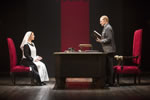
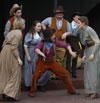
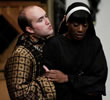
 Find additional Shakespeareances
Find additional Shakespeareances